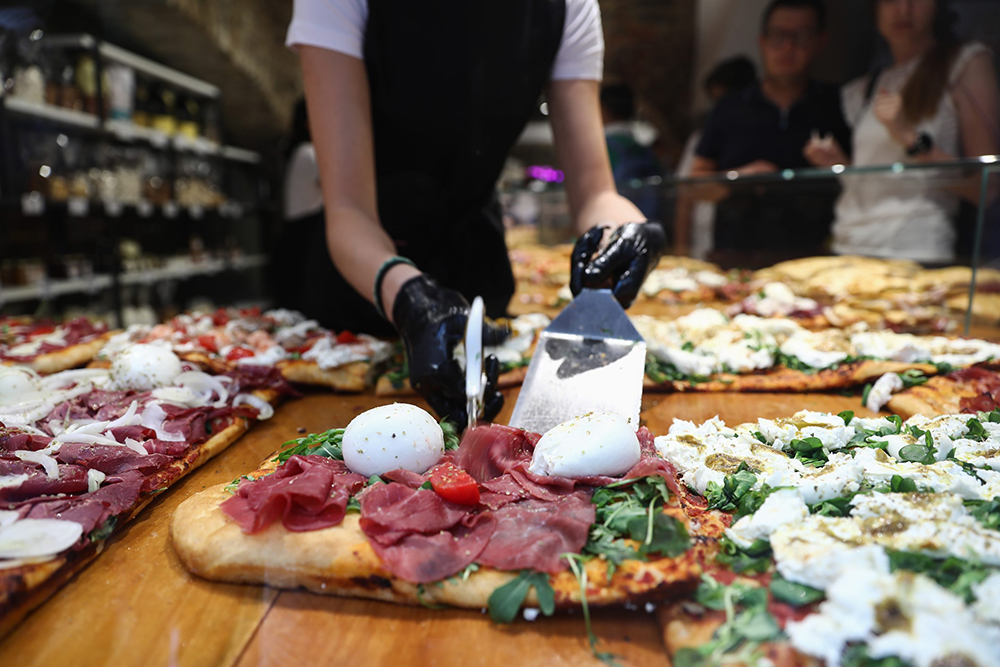
意大利政府已采取行动禁止生产实验室培育的肉类,这是该国右翼政府采取的一项具有里程碑意义的举措,政府称这是为了保护意大利文化和农业部门。
周四,意大利参议院以压倒性多数通过了一项禁止培育人造肉的法案,使该国成为欧洲第一个禁止培育人造肉的国家。
根据新指导原则,被发现生产实验室培育的肉类的工厂将面临高达15万欧元(合16.27万美元)的罚款。
“花椰菜牛排”也从菜单上消失了,因为该国禁止使用与肉类有关的词语来推销素食产品。
《金融时报》(Financial Times)报道称,该法案中写道:“像‘豆腐牛排’或‘素食熏火腿’这样的词……揭示了一种不恰当的现象,即使用传统上与肉类相关的标签来销售含有植物蛋白的产品。”
意大利最新的文化战争
农业和粮食主权部长弗朗切斯科·洛洛布里吉达(Francesco Lollobrigida)在脸书(Facebook)上发帖说:“我们是第一个禁止实验室培育肉类的国家,这让那些希望从中牟取暴利、危及公民就业和健康的跨国公司懊恼不已。”
实验室培育的肉类允许利用动物细胞生产食品,消除了与牲畜有关的环境和伦理顾虑。
意大利禁止这种产品的举措受到了意大利农业团体的赞扬,他们热衷于保护该国价值93亿欧元(101亿美元)的肉类加工业。(意大利最大的农民协会)意大利农业联合会(Coldiretti)警告称,允许使用实验室培育的肉类将预示着跨国公司的崛起,从而牺牲意大利本土生产商的利益。
意大利农业联合会总裁埃托尔·普兰迪尼(Ettore Prandini)在脸书上发帖说:“我们很自豪能成为第一个尽管支持研究,但却先发制人地阻止销售实验室生产的食品的国家,目前尚不清楚这些食品对消费者健康的影响。”
尽管意大利保护本国肉类产业的背后有着明显的经济动机,但这也反映了意大利总理焦尔吉娅·梅洛尼(Giorgia Meloni)及其右翼政党意大利兄弟党发起的一场更大的文化战争。
洛洛布里吉达也是梅洛尼的姐夫,他在接受《政治报》(Politico)采访时表示,此举是为了保护意大利生产腊肠和熏火腿的传统。
洛洛布里吉达说:"如果你生产的食品与人、土地和工作无关,你就可以把生产转移到税收更低、环保标准更低的地方,这会损害就业和环境。”
梅洛尼自去年10月就任总理以来,一直在为意大利的其他文化机构奔走,包括艺术和媒体。她被指控试图罢免博物馆的左翼领导人,以安插支持她的意识形态的人。
她还亲自参与了未来文化产品的设计。
据《共和国报》(La Repubblica)报道,梅洛尼计划举办《指环王》(Lord of the Rings)展览,以纪念作家J.R.R.托尔金(J.R.R Tolkein)逝世50周年。这个故事在上世纪70年代被意大利右翼分子用作与金融精英的斗争。
一位官员告诉《政治报》,文化部为此次展览花费了25万欧元(合27.1万美元)。
“战斗现在转移到了欧洲”
意大利禁止人造肉的举措与包括美国在内的其他国家对人造肉采取的更为宽松的指导原则有所不同。今年6月,美国农业部批准销售用动物细胞制成的鸡肉。
其他欧洲国家也在慢慢接受实验室培育肉类的扩张,根据一项预测,到2035年,人造肉的价值估计将接近20亿美元。今年7月,荷兰成为欧洲第一个批准对实验室培育的肉类进行品尝测试的国家。
然而,意大利政府雄心勃勃,希望其保护主义举措能在整个欧洲大陆流行起来。
“意大利在食品质量和安全方面处于世界领先地位,有责任在保护公民健康的政策方面发挥带头作用。”意大利农业联合会总裁普兰迪尼告诉《政治报》。“战斗现在转移到了欧洲。”
虽然意大利可以阻止企业在国内生产人造肉,但监管人造肉在国内的销售却面临着更大的困难。意大利是欧盟单一市场和关税同盟的一部分,要确保商品和服务在欧盟内部自由流动。 (财富中文网)
译者:中慧言-王芳
意大利政府已采取行动禁止生产实验室培育的肉类,这是该国右翼政府采取的一项具有里程碑意义的举措,政府称这是为了保护意大利文化和农业部门。
周四,意大利参议院以压倒性多数通过了一项禁止培育人造肉的法案,使该国成为欧洲第一个禁止培育人造肉的国家。
根据新指导原则,被发现生产实验室培育的肉类的工厂将面临高达15万欧元(合16.27万美元)的罚款。
“花椰菜牛排”也从菜单上消失了,因为该国禁止使用与肉类有关的词语来推销素食产品。
《金融时报》(Financial Times)报道称,该法案中写道:“像‘豆腐牛排’或‘素食熏火腿’这样的词……揭示了一种不恰当的现象,即使用传统上与肉类相关的标签来销售含有植物蛋白的产品。”
意大利最新的文化战争
农业和粮食主权部长弗朗切斯科·洛洛布里吉达(Francesco Lollobrigida)在脸书(Facebook)上发帖说:“我们是第一个禁止实验室培育肉类的国家,这让那些希望从中牟取暴利、危及公民就业和健康的跨国公司懊恼不已。”
实验室培育的肉类允许利用动物细胞生产食品,消除了与牲畜有关的环境和伦理顾虑。
意大利禁止这种产品的举措受到了意大利农业团体的赞扬,他们热衷于保护该国价值93亿欧元(101亿美元)的肉类加工业。(意大利最大的农民协会)意大利农业联合会(Coldiretti)警告称,允许使用实验室培育的肉类将预示着跨国公司的崛起,从而牺牲意大利本土生产商的利益。
意大利农业联合会总裁埃托尔·普兰迪尼(Ettore Prandini)在脸书上发帖说:“我们很自豪能成为第一个尽管支持研究,但却先发制人地阻止销售实验室生产的食品的国家,目前尚不清楚这些食品对消费者健康的影响。”
尽管意大利保护本国肉类产业的背后有着明显的经济动机,但这也反映了意大利总理焦尔吉娅·梅洛尼(Giorgia Meloni)及其右翼政党意大利兄弟党发起的一场更大的文化战争。
洛洛布里吉达也是梅洛尼的姐夫,他在接受《政治报》(Politico)采访时表示,此举是为了保护意大利生产腊肠和熏火腿的传统。
洛洛布里吉达说:"如果你生产的食品与人、土地和工作无关,你就可以把生产转移到税收更低、环保标准更低的地方,这会损害就业和环境。”
梅洛尼自去年10月就任总理以来,一直在为意大利的其他文化机构奔走,包括艺术和媒体。她被指控试图罢免博物馆的左翼领导人,以安插支持她的意识形态的人。
她还亲自参与了未来文化产品的设计。
据《共和国报》(La Repubblica)报道,梅洛尼计划举办《指环王》(Lord of the Rings)展览,以纪念作家J.R.R.托尔金(J.R.R Tolkein)逝世50周年。这个故事在上世纪70年代被意大利右翼分子用作与金融精英的斗争。
一位官员告诉《政治报》,文化部为此次展览花费了25万欧元(合27.1万美元)。
“战斗现在转移到了欧洲”
意大利禁止人造肉的举措与包括美国在内的其他国家对人造肉采取的更为宽松的指导原则有所不同。今年6月,美国农业部批准销售用动物细胞制成的鸡肉。
其他欧洲国家也在慢慢接受实验室培育肉类的扩张,根据一项预测,到2035年,人造肉的价值估计将接近20亿美元。今年7月,荷兰成为欧洲第一个批准对实验室培育的肉类进行品尝测试的国家。
然而,意大利政府雄心勃勃,希望其保护主义举措能在整个欧洲大陆流行起来。
“意大利在食品质量和安全方面处于世界领先地位,有责任在保护公民健康的政策方面发挥带头作用。”意大利农业联合会总裁普兰迪尼告诉《政治报》。“战斗现在转移到了欧洲。”
虽然意大利可以阻止企业在国内生产人造肉,但监管人造肉在国内的销售却面临着更大的困难。意大利是欧盟单一市场和关税同盟的一部分,要确保商品和服务在欧盟内部自由流动。 (财富中文网)
译者:中慧言-王芳
Italy’s government has moved to ban the production of lab-grown meat, a landmark move the country’s right-wing government says it has taken to protect Italian culture and its agriculture sector.
The country became the first in Europe to ban the cultivation of artificial meat with a bill signed into law Thursday after winning an overwhelming majority in Italy’s senate.
Factories found to be producing lab-grown meat face fines of up to €150,000 ($162,700) under the new guidelines.
“Cauliflower steaks” are also off the menu, as the country moved to ban the use of meat-related words to market vegetarian products.
“Words like ‘tofu steak’ or ‘veg prosciutto’… reveal an inappropriate phenomenon of using labels traditionally associated with meat to sell products with vegetable protein,” the Financial Times reported the bill as reading.
Italy’s newest culture war
“We are the first nation to ban it, to the chagrin of multinational companies that hoped to make monstrous profits, jeopardizing the jobs and health of citizens,” Francesco Lollobrigida, minister for food sovereignty and agriculture, said in a post on Facebook.
Lab-grown meat allows the production of food from animal cells, removing the environmental and ethical concerns related to livestock.
Italy’s move to ban the products been praised by Italian agricultural groups, keen to protect the country’s €9.3 billion ($10.1 billion) meat-processing industry. Coldiretti, Italy’s biggest farmers association, warned that the allowance of lab-cultured meat would herald the rise of multinational companies at the expense of local Italian producers.
“We are proud to be the first country that, despite being in favor of research, preemptively blocks the sale of lab-produced food, the effects of which are currently unknown on the health of consumer citizens,” Ettore Prandini, president of Coldiretti, said in a Facebook post.
While there is an obvious economic motivation behind Italy protecting its meat industry, it also reflects a bigger culture war being waged by Italian Prime Minister Giorgia Meloni and her right-wing Brothers of Italy party.
Speaking to Politico, Lollobrigida, who is also Meloni’s brother-in-law, framed the move as one that would protect Italy’s heritage of producing salami and prosciutto.
“If you produce a food that has no relationship to man, land, work, you can move production to a place with lower taxes and less environmental standards, hurting jobs and the environment,” Lollobrigida.
Meloni has made a bee-line for Italy’s other cultural institutions—including arts and the media—since becoming PM in October last year. She has been accused of trying to oust left-leaning leaders of museums to install people who support her ideology.
She is also taking a personal role in crafting future cultural output.
Meloni plans to open a Lord of the Rings exhibition to commemorate the 50th anniversary of author J.R.R Tolkein’s death, La Repubblica reported. The story was appropriated by the Italian right in the 1970s as a perceived struggle against financial elites.
The Ministry of Culture spent €250,000 ($271,000) on the exhibition, an official told Politico.
‘The battle now moves to Europe’
Italy’s move to ban fake meat diverges with more liberal guidelines on artificial meat in other countries, including the U.S. In June, the country’s Agriculture Department signed off on the sale of chicken made from animal cells.
Other European countries are slowly embracing the expansion of lab-grown meat, which according to one forecast is estimated to be worth nearly $2 billion by 2035. The Netherlands became the first country in Europe to approve taste testing of cultivated meat in July.
However, Italy’s government has ambitions that its protectionist move might catch on across the continent.
“Italy which is the world leader in food quality and safety, has the duty to lead the way in policies to protect citizens’ health.” Cooldirett’s Pradini told Politico. “The battle now moves to Europe.”
While Italy can stop companies from producing artificial meat domestically, it faces a tougher time regulating its sale in the country. Italy is part of the European Union’s single market and customs union, ensuring the free movement of goods and services across






